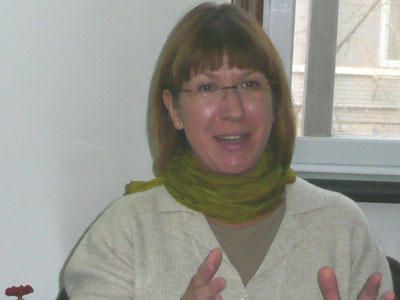
黄行(右)讲话欢迎比安卡·何乐文(左)来访

右起:黄行,萨姆•迈尔斯,比安卡·何乐文

右起:何乐文、冯乃明、山田亨

座谈会进行中

何乐文回答提问

座谈会一角
2009年农历春节刚过,中国社科院民族所就迎来了外国学者来访。2月3日,德国柏林洪堡大学中亚研究研究员比安卡•何乐文(Bianca Horlemann)博士,在中国社科院民族所作了《传教士与民族志:19世纪末20世纪初基督教传教士在青海和甘肃的传教活动》的学术讲座。参加座谈会的有美国明尼苏达大学哈姆弗瑞公共事务研究所教授萨姆•迈尔斯(Samuel L. Myers, Jr.)先生,美国夏威夷大学人类学系博士研究生冯乃明(Naomi Furnish Yamada)女士、山田亨(Toru T.D. Yamada)先生,以及来自中国社科院民族所和中央民族大学的专家学者共20人。座谈会由人类学世界大会学术筹备办公室杜发春副研究员主持。
中国社科院民族所副所长黄行教授出席座谈会讲话,对何乐文博士和参加座谈会的专家学者表示欢迎,希望进一步加强业已建立的学术交流关系。黄行说,藏族历史与宗教是藏学研究的传统学术研究领域,如何在其中发现新的研究线索,提出新的理论思维,也是当前藏学研究领域所关注的热点问题之一。这次何乐文博士关于传教士与民族志的学术讲座,从历史角度研究19世纪末20世纪初西方传教士在中国西北地区传教活动,为中国学者的藏学研究和宗教研究提供了不少新的线索。
何乐文博士首先介绍了在19世纪晚期20世纪早期,西方一些天主教和新教的传教士来到了青海和甘肃,他们归属于不同的宗教社团、修会。当时在甘青的天主教休会主要有:比利时的圣母圣心会 (1878-1922,Missionaries of Scheut/CICM),西班牙的圣芳济各嘉布会(1930-1953,Capuchins/OFMCap),德国的圣芳济各嘉布会 (1922-1952,Capuchins/OFMCap), 德国-荷兰的圣言会 (1922-1953,Missionaries of Steyl/SVD)。当时在甘青的新教(耶稣教)教会主要有:英国的中华内地会 (1878-1940s,China Inland Mission/CIM),美国的宣道会 (1895-1949,China Tibetan Border Mission within the Christian & Missionary Alliance/C&MA)、神召会 (1918-1949,Assemblies of God)、北美瑞挪会 (1895-?,Scandinavian Alliance Mission SAM)等。根据历史资料,最早到甘青的新教传教士是在1876年,最早到甘青的天主教传教士是在1878年。到了1953年中国驱逐外国宗教时,青海和甘肃的外国传教士达450余人。
何乐文博士在讲座中为参会者播放了许多珍贵的传教士的原版资料,以此呈现19世纪晚期20世纪早期活跃在甘肃和青海的各种传教活动。她说,当时西方传教士以办学校、医院、 救济事业等方式传播基督教(天主教和新教),开拓教区。当时中国深刻的社会矛盾、青海和甘肃地区复杂的民族矛盾也为外来宗教的传播提供了条件。何乐文博士指出,19世纪晚期20世纪早期,西方多数传教士把主要精力集中在汉族地区,也有一些人会特别关注安多藏人。更有甚者,这些深入藏区的传教士不但精通藏语,而且对于安多藏族的日常生活、风俗习惯和宗教信仰了如指掌。其中一些人,比如新教传教士Robert B. Ekvall和天主教传教士P. Matthias Hermanns,后来成为训练有素的民族学家,并出版了多部关于安多藏人的著作和文献。但是,除了这些早期的学术著作,甘肃和青海的大量深入藏区的传教士也留下了大量著作,而却很少有人问津,其中包括传教日志、报告、信函和日记。最引人注目的还是这些传教文献中的珍贵照片;范围广泛,从藏族的日常的风俗、节日到寺庙和德高望重的僧人,都有涉及。今天,我们有幸能够看到一些流传下来并保存完好的相片集,比如传教士Marion G. Griebenow编著的Griebenow相册集。
参会的专家学者先后提问并与何乐文博士进行了深入的交流,内容涉及到:历史上基督教在甘肃和青海的传播过程中的主要形式、面临的困难,西方传教士传教过程中与藏传佛教和伊斯兰教的关系和矛盾,甘青地区基督教的地方化问题等。
讲座结束后,何乐文、冯乃明、山田亨等还参观了设在中国社科院民族所四楼的人类学世界大会学术筹备办公室,与办公室工作人员就大会的学术筹备工作交换了意见,他们都将参加2009年7月27-31日在中国昆明召开的人类学世界大会。何乐文女士此次是到甘肃和青海做田野调查前途经北京顺访民族所的,她曾于2007年11月访问过中国社科院民族所。洪堡大学(Humboldt-University zu Berlin)成立于1810年10月,这所国家资助、男女合校的高等学府是当时的普鲁士教育大臣、德国著名学者、教育改革家威廉•冯•洪堡创办的,被誉为“德意志文明的摇篮”。目前洪堡大学共有11个学院及各种中心研究所、共有37000就读的学生,2,600名教职员工中,教授级别以上的占有359个。
Seminar on Missionary and Ethnograph: Dr. Bianca Horlemann lectured at the Institute of Ethnology and Anthropology CASS
On 3rd of February 2009, after the Chinese Lunar New Year Holiday, Dr. Bianca Horlemann, Associate Researcher, Central Asia Seminar, Humboldt University, Berlin Germany visited the Institute of Ethnology and Anthropology at the Chinese Academy of Social Sciences (IEA/CASS). A seminar on Missionary and Ethnography: Christian Missionaries in Qinghai and Gansu in the late 19th/early 20th Century, held in IEA in Beijing.
Professor HUANG Xing, Vice Director of IEA/CASS addressed a welcome remarks to Dr. Bianca Horlemann’s visit and to all the participants, he hopes to strength the academic exchange and co-operation for both sides. There are 20 scholars from the USA, Japan and China attended this meeting, including Professor Samuel L. Myers, Jr., Hubert H. Humphrey Institute of Public Affairs at the University of Minnesota, Ms Naomi Furnish Yamada and Mr. Toru T.D. Yamada, PhD Candidate, Department of Anthropology at the University of Hawaii at Manoa, and scholars from CASS and the Central University for Nationalities attended this event, which organized by Professor DU Fachun in IEA/CASS.
In her talk, Dr. Horlemann provides an overview of source material by Christian Missionaries in Qinghai and Gansu in the late 19th/early 20th Century. She said that the first few Catholic missionaries who came to explore the possibilities of evangelizing in Gansu and Qinghai, arrived in the 1878 and the first Protestant missionaries in about 1876. Up to 1953 when the last missionaries were expelled from Gansu and Qinghai by the new Communist government of China, some 450 or more missionaries (including Catholic nuns and the wifes of the Protestant missionaries) had served in Gansu and Qinghai over the years. Each missionary congregation had a regional and ethnic focus in its missionary activities
Dr. Horlemann points out that during the late 19th/early 20th century a considerable number of Catholic and Protestant missionaries were present in Qinghai and Gansu, e.g. the Belgian Catholic Missionaries of Scheut, the German-Dutch Catholic Missionaries of Steyl, the England based China Inland Mission, the America based Christian and Missionary Alliance, the so-called Tibetan Tribes Mission and several more. Although most of the missionaries concentrated their missionary efforts on the Han-Chinese population, some of them had special inclinations towards proselytizing among the Amdo Tibetans. Furthermore, several of these Tibet missionaries not only became very well versed in the Tibetan language but also proved to be very keen observers of Tibetan everyday life, of Tibetan customs and Tibetan religious beliefs. Some, as for example the well-known Protestant missionary Robert B. Ekvall or the Catholic missionary P. Matthias Hermanns, later became trained ethnologists and published several books and articles on Amdo Tibetans. But apart from pioneering academic publications, a considerable number of the Tibet missionaries in Gansu and Qinghai have also left behind a rarely tapped source of written material such as articles in missionary journals, reports, letters and diaries. Of special interest might also be the many photographs that accompany the articles in the missionary journals; their topics span from Tibetan everyday life over costumes and festivals to monasteries and eminent monks or lay people. Several photo collections have survived to this day as for example the Griebenow Collection of the protestant missionary Marion G. Griebenow.
Furthermore, in the period of questions and answers, Dr. Bianca Horlemann provides a detailed information about the types of Contacts/Experiences of the Missionaries, the localization of Christian, conflicts with the local religions (Buddhism, Muslim) in Qinghai and Gansu, etc. She said that Missionaries contacts with the local population through active proselytizing, e.g. preaching, founding and running of missionary schools, hospitals, dispensaries, orphanages. Missionaries Contacts with local officials, politicians and dignitaries through official contacts such as invitations, banquets, etc, mutual support in difficult situations (such as organizing famine relief etc.), problems with the local administrations or individual officials (such as in buying property, in litigations etc.).
Dr. Bianca Horlemann is now doing a research project on the historic relationship between Muslims and Tibetans in Gansu and Qinghai. She just published the first bibliographic article which deals exclusively with the material by the German missionaries of Steyl entitled “The Divine Word Missionaries in Gansu, Qinghai and Xiinjiang, 1922-1953: A Bibliographic Note”, Journal of the Royal Asiatic Society (2009), 19:59-82 Cambridge University Press. She could be reached at(bianca.horlemann@web.de).